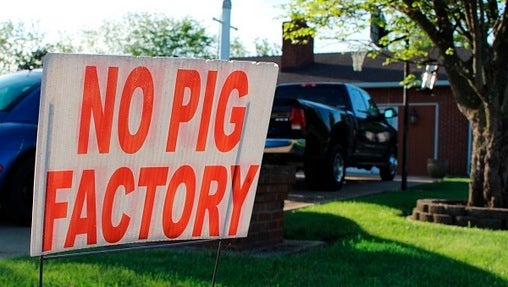In cases of ‘nuisance’ farms, Pa. plaintiffs are often out of luck
Pennsylvania law makes it near-impossible to sue farms for nuisances like smells.

In this May 21, 2018 photo, a sign opposing an industrial hog farm is displayed at a home in Berwick, Pa. Residents who complain about foul smells from the nearby hog farm have taken their fight to the Pennsylvania Supreme Court. (Michael Rubinkam/AP Photo)
For several years, a hog farm in Pennsylvania’s Luzerne County has been under legal fire for emitting a stench that people say can make the surrounding area almost unlivable.
A lawsuit is now awaiting consideration before the state Supreme Court.
But the outlook isn’t good — and that’s largely because state law makes it nearly impossible to sue farms for odors and other nuisances.
Will-O-Bett Farm’s hog-feeding operation — which is causing the smell — began in 2013 in Salem Township. People living nearby sued in county court the following year, and the legal volleys have been ongoing since.
Those disgruntled neighbors have repeatedly lost in lower courts, because the commonwealth’s Right to Farm Act effectively prohibits nuisance lawsuits if a farm is complying with the law and not causing any health issues. The law also keeps municipalities from passing their own regulations to override it.
Every state has some form of Right to Farm law.
Rusty Rumley, an attorney with the National Agricultural Law Center, said Pennsylvania’s is somewhere in the middle in terms of strictness.
“Generally speaking, the more important agriculture is to a state’s economy, the stronger the Right to Farm protections will be,” he said.
State Rep. Mark Keller, R-Cumberland, acknowledged that can put farmers’ neighbors in a tough spot. But he said it’s a necessary trade-off.
“If we continue to push the agricultural industry out of Pennsylvania — or even the United States — then we end up importing our food products,” said Keller, a frequent advocate for farmers.
An underlying problem is that more farms are being sold and turned into housing developments, which can lead to tension between the remaining farmers and their new neighbors, he said.
“There’s only so much land — you can’t make more of that. And, you know, the farms are taken and you’ve got one farm left amongst the development. That’s what creates the issue,” he said.
One potential solution, he said, would be more county government participation in the commonwealth’s Agricultural Conservation Easement Purchase Program. Under that program, they can purchase easements that guarantee farmland stays farmland — and it could ultimately keep farms clustered, and away from neighborhoods.
Pennsylvania already has the highest rate of farmland preservation nationwide.
WHYY is your source for fact-based, in-depth journalism and information. As a nonprofit organization, we rely on financial support from readers like you. Please give today.





